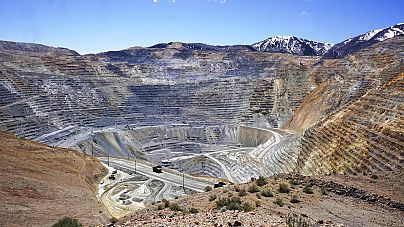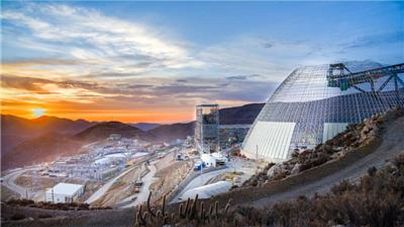Euronews Business takes a look at the performance of mining stocks across Europe in 2023 and looks at the outlook for companies in 2024.
Rio Tinto, Glencore and Anglo American have faced some tough conditions in 2023 but their ambitions for 2024 are still strong.
 ADVERTISEMENT
ADVERTISEMENT
 ADVERTISEMENT
ADVERTISEMENT
Despite the challenges faced by the global mining industry - such as erratic exchange rates, increased costs of handling and shipping - and unpredictable demands, the sector managed to thrive and evolve in 2023 with the advancement in technology and digitalisation.
However, with the fiercely competitive landscape, miners can no longer depend on conventional practices and trends. To stay relevant, the mining companies will have to vouch for the era of reinvention to achieve ongoing success.
For 2023, globally, the supply and demand in major mining commodities remained balanced with no concerns about fundamental oversupply.
However, climate change and geopolitical shifts remain the major challenge for the sustenance of the mining sector, requiring adaptive strategies and innovative solutions to ensure its long-term viability and environmental compatibility.
Due to global economic decline, the demand for some metals has hit a setback.
What are mining stocks?
Before looking at some of the key mining stocks to watch in Europe, here’s a brief overview of what mining stocks are:
Most mining stocks fall into the main mining sectors including minerals, precious metals, energy materials, base metals and building materials.
The mined minerals that are used to make building materials, insecticides & detergents are known as minerals. For example, aluminium, platinum and gypsum. The precious metals include silver, palladium and gold as they carry value as icons of perceived value.
The energy materials include uranium and fossil fuels like coal, oil and natural gas. Zinc, lead, steel, tin and copper are known as base metals while iron ore production is frequently used in building materials and structures.
Mining stocks to watch in 2024
Rio Tinto
The world’s biggest iron ore producer, Rio Tinto, made some significant changes in 2023, including greater use of autonomous technology to boost production levels.
To achieve its objective, it has made a noteworthy contribution in 2023; it shipped 83.9 million tons of iron ore from Pilbara in the September quarter, compared with 82.9 million a year earlier.
Rio reported a 1.2% rise in its third-quarter iron ore shipments. It also signed an agreement to form the Matalco aluminium joint venture to enter the exciting and fast-growing aluminium recycling industry in North America.
Aluminium production was 9% higher than the third quarter of 2022 as they returned to full capacity at the Kitimat smelter. Mined copper production, meanwhile, was 5% higher than the third quarter of 2022.
The company’s chief executive, Jakob Stausholm, mindfully chalked out the medium and long-term goals to shape their portfolio for the future while contributing to society's drive to net zero.
In 2024, owing to the commodity price strength and production growth, Rio Tinto’s dividend is expected to increase to €4.12. This increase correlates with a €4.20 per share (A$6.78 per share) in local currency.
Glencore
Glencore, being one of the world’s largest globally diversified natural resource companies, reported a solid first-half production performance.
Glencore Chief Executive Officer, Gary Nagle, stated: “In our marketing segment, progressively through 2023, the particularly elevated commodity market imbalances and volatility levels that prevailed through much of 2022, have largely normalised, which, while clearly impacting profitability, has allowed for the release of some of the investment made in non-Responsible Mineral Initiative (RMI) marketing working capital in 2022.”
“We continue to expect a full year 2023 adjusted Earning before Interest and Taxes (EBIT) outcome above the top end of our $2.2-3.2 billion per annum long-term guidance range, likely in the $3.5-4.0 billion range.”
Glencore’s climate report, which was published at its annual meeting in May, was turned down by more than 30% of its investors. As the production of thermal coal is the most polluting of its resources, around 29% of its shareholders backed a resolution seeking more clarity on progress in scaling back its production. During 2023, the shares of Glencore haven’t performed well, hence to date, they are down by almost 20%.
Anglo American
Just like Rio Tinto, Glencore and Teck Resources, Anglo American reported lower profits and returns during the first half of the year. To quote the Chief executive Duncan Wanblad, "in the near-term, given continuing elevated macro volatility, we are being deliberate in reducing our costs and prioritising our capital to drive more profitable production on a sustainable basis."
In 2024, the overall production of the Anglo mines will be decreased by 4%, further taking down the unit costs by 2%. Moreover, the capital expenditure will be approximately $5.7 billion. The group of 11 analysts have predicted that the core profit of Anglo to be at $10.2 billion in 2023.
European shares registered strong growth in the first week of December 2023, supported by prospects of a halt in the monetary policy tightening cycle. Anglo American came out at the top of the STOXX 600 with a gain of 7.9 % as UBS upgraded their outlook from buy to neutral.
Moving forward inventors need to closely watch the economic data coming out of China as it accounts for 70 % of iron ore trade and 50 % of copper. If there is a resurgence in demand in commodities it can spill over to the mining sector as well. Fitch Ratings see a growing demand for base metals assuming a jump in Chinese demand.












